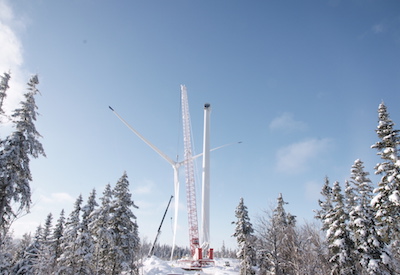Two Research Centres Team Up to Study the Impact of Climate Change on Wind Energy Potential

May 4, 2018
Ouranos, a research consortium dedicated to regional climatology and climate change adaptation, and Nergica, an applied research centre specializing in renewable energy, have begun a research project that aims to assess the impact that climate change will have on wind energy potential in the decades to come. The project will be carried out in a partnership with Hydro-Québec, Manitoba Hydro, Ontario Power Generation, and the Quebec Wind Energy Cluster.
With power purchase agreements of wind farms set to expire between now and the end of the next decade, the wind industry is poised to potentially undergo large-scale repowering of its wind farms. The effect of climate change on wind regimes and icing events must be taken into account in order to ensure the best planning possible for repowering wind turbines operating in cold climates.
“The repowering process aims to modernize wind turbines in order to improve wind farm efficiency and performance,” explains Simon-Philippe Breton, Project Manager, Research and Innovation at Nergica. “To date, very few studies have been conducted that take climate change into account when assessing future wind potential in Canada. This research project will help to anticipate changes in energy yields and to analyze the impacts on wind farm production costs and profitability. Ultimately, different stakeholders in the industry will be able to make choices that are best suited to a changing climate.”
Nergica will coordinate the analysis of the impact of climate change on wind production, while Ouranos will notably produce new climate simulations for North America for the period from 1950 to 2100. “In the past, Ouranos carried out a number of projects on hydroelectricity-related issues,” explains Jacinthe Clavet-Gaumont, co-coordinator of Ouranos’ Energy program. “This new partnership with Nergica reflects Ouranos’ desire to expand its research horizons and support climate change adaptation efforts for other renewable energy sources. This pan-Canadian project will allow our climate and economic analyses to be shared in the public domain, particularly those related to wind, which is a variable that hasn’t been studied as much in climate simulations.”
Canadian grid operators Hydro-Québec, Manitoba Hydro and Ontario Power Generation will contribute to the project by providing meteorological observations and energy production data, in addition to their analytical expertise. The study will allow them to fine-tune their long-term wind planning and increase reliability. The Quebec Wind Energy Cluster will participate in the economic analysis and in sharing the results with the industry.
The three-year project, evaluated at over $800,000, is being financed by the Natural Sciences and Engineering Research Council of Canada (NSERC), InnovÉÉ, Hydro-Québec and the Green Climate Fund.











![Guide to the Canadian Electrical Code, Part 1[i], 26th Edition– A Road Map: Section 56](https://electricalindustry.ca/wp-content/uploads/2022/11/Guide-CE-Code-2.png)



